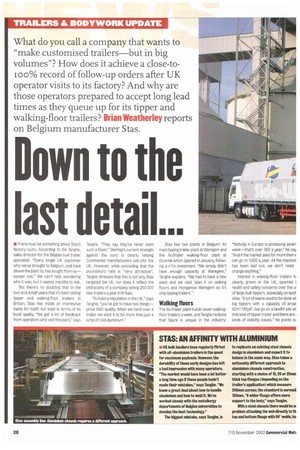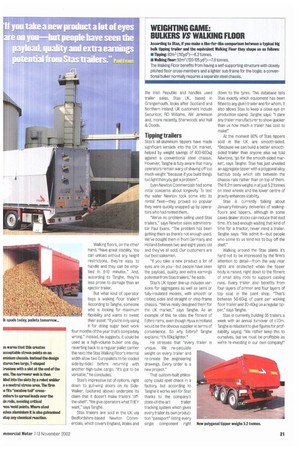D own to the last detail • III What do you
Page 20

Page 21

If you've noticed an error in this article please click here to report it so we can fix it.
call a company that wants to "make customised trailers—but in big volumes"? How does it achieve a close-toio o% record of follow-up orders after UK operator visits to its factory? And why are those operators prepared to accept long lead times as they queue up for its tipper and walking-floor trailers? Brian Weatherley reports on Belgium manufacturer Stas.
• There must be something about Stas's factory tours. According to Rik Tanghe, sales director for the Belgian bulk trailer specialist: "Every single UK customer who we've brought to Belgium, and have shown the plant to, has bought from us— except one." We can't help wondering who it was, but it seems impolite to ask.
But there's no doubting that in the two-and-a-half years that it's been selling tipper and walking-floor trailers in Britain, Stas has made an impressive name for itself; not least in terms of its build quality. "We get a lot of feedback from operators who visit the plant,' says
Tanghe. "They say they've never seen such a finish." Sterling's current strength against the euro is clearly helping Continental manufacturers sell into the UK. However, while conceding that the pound/euro rate is "very attractive", Tangle stresses that this is not why Stas targeted the UK, nor does it reflect the philosophy of a company selling 250-300 new trailers a year in Britain.
"To build a reputation n the UK," says Tanghe. '`you've got to have two things— price AND quality. When we hand over a trailer we want it to be more than just a lump of cold aluminium."
Stas has two plants in Belgium: its main tipping trailer plant at Waregem and the AluTrailer walking-floor plant at Doornik which opened in January, following a €7m investment. "We simply didn't have enough capacity at Waregem," Tanghe explains. "We had to have a new plant and we said 'plan it on walking floors and reorganise Waregern so it's only tipping trailers'."
Walking floors
The AluTrailer plant builds seven walkingfloor trailers a week, and Tanghe reckons that figure is unique in the industry:
"Nobody in Europe is producing sever week—that's over 300 a year," he say "And if the market asks for more then v can go to 1,000 a year. All the machinii has been laid out: we don't need change anything," Interest in walking-floor trailers IN clearly grown in the UK, spurred I health and Safety Concerns over the u: of large bulk tippers, especially on land sites. "A lot of waste used to be done wi big tippers with a capacity of arour B2m,7110yd3, but go or a landfill site wi that kind of tipper trailer and there are ; kinds of stability issues," he points a
Walking floors, on the other hand, have great stability. You can unload without any height restrictions, they're easy to handle and they can be emptied in 8-10 minutes." And, according to Tanghe, they're less prone to damage than an ejector trailer.
But what kind of operator buys a walking floor trailer? According to Tanghe, someone who is looking for maximum flexibility and wants to sweat their asset: you're only using it for doing sugar beet work four months of the year that's completely wrong," Instead, he suggests, it could be used as a high-volume bulker one day, reverting back to a regular pallet carrier the next (the Stas Walking Floor's internal width allow two Eurcipallets to be loaded side-by-side) before returning with another high-cube cargo. "it's got to be versatile," he concludes.
Stas's impressive list of options, right down to gull-wing doors on its SideWalker, (pictured above) underpins its claim that it doesn't make trailers 'offthe-shelf'. "We give operators what THEY want." says Tanghe.
Stas trailers are sold in the UK via Bedfordshire-based Newton Commercials, which covers England, Wales and the Irish Republic and handles used trailer sales. Stas UK, based in Grangemouth, looks after Scotland and Northern Ireland. UK customers include Securicor, RD Williams, AW Jenkinson and. more recently, Sherwoods and Yuji! &Dodds.
Tipping trailers
Stas's all-aluminium tippers have made significant inroads into the UK market, helped by weight savings of 400-600kg against a conventional steel chassis. However, Tanghe is fully aware that many operators remain wary of shaving off too much weight "because if you build things too light then you get a problem".
Even Newton Commercials had some initial concerns about longevity. To test the water Newton took some into its rental fleet—they proved so popular they were quickly snapped up by operators who had rented them.
"We've no problem selling used Stas trailers," says Newton sales administrator Paul Evans. "The problem has been getting them as there's not enough used. We've bought them in from Germany and Holland between two and eight years old and they've all sold. Our customers are our best salesmen.
"if you take a new product a lot of eyes are on you—but people have seen the payload, quality and extra earnings potential from Stas trailers," he adds.
Stas's UK tipper line-up includes versions for aggregates as well as semi or fully-insulated models, with smooth or ribbed sides and straight or step-frame chassis. "We've really designed them for the UK market," says Tanghe. As an example of this he cites the fitment of Edbro rams, even though Hyva in Holland would be the obvious supplier in terms of convenience. So why Edbro? Tanghe explains: "It's 80kg lighter."
He stresses that "every trailer is unique. We re-calculate weight on every trailer and re-create the engineering drawings. Every order is a new project."
That custom-built philosophy could spell chaos in a factory, but according to Tanghe it works well for Stas thanks to the company's state-of-the-art trailer tracking system which gives every trailer its own production "passport" listing every single component right down to the tyres. This database tells Stas exactly which equipment has been fitted to any given trailer and for whom. It also allows Stas to keep a close eye on production spend. Tanghe says: "I dare any trailer manufacturer to show quicker than us how much a trailer has cost to make!"
At the moment 80% of Stas tippers sold in the UK are smooth-sided. "Because we can build a better smoothsided trailer than anyone else we told Newtons, `go for the smooth-sided market', says Tanghe. Stas has just unveiled an aggregate tipper with a polygonal alloy bathtub body which sits between the chassis rails rather than on top of them. The 6.2m semi weighs in at just 5.2 tonnes on steel wheels and the lower centre of gravity enhances stabiliV.
Stas is currently talking about January-February deliveries of walkingfloors and tippers, although in some cases dealer stocks can reduce that lead time. It's bad enough waiting that kind of time for a tractor, never mind a trailer. Tanghe says: "We admit it—but people who come to us tend not to buy off the shelf."
Walking around the Stas plants it's hard not to be impressed by the firm's attention to detail—from the way rear lights are protected when the tipper body is raised, right down to the fitment of small alloy rods to support cabling runs, Every trailer also benefits from four layers of primer and four layers of top coat in the paint shop. "That's between 50-604 of paint per walking floor trailer and 30-40kg on a regular tipper,' says Tanghe.
Stas is currently building 35 trailers a week with an annual turnover of €70m. Tanghe is reluctant to give figures for profitability, saying: "We rather keep this to ourselves, but we must be profitable as we're re-investing in our own company!"




























































































































































